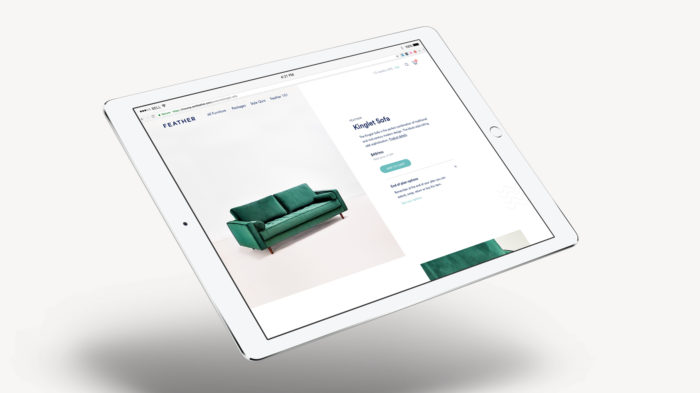How This Startup Created ‘Furniture by Subscription’
Brooklyn-based Feather thinks consumers will feel liberated by lifting the burden of owning the stuff they sit on
Feather's offerings include packages of furniture like this one from West Elm, which starts at $106 a month, with a retail value of $1,846 (Photos couresty of Feather)
Within just the first six years of his life as a New Yorker, Jay Reno, who’s originally from New Hampshire, moved on five different occasions. “Each time, I was presented with an entirely new furniture situation,” Reno says. Once, when he moved in with his fiancé, they realized a sofa they’d bought on Craigslist would be impossible to squeeze up the stairwell and into their new home. “We had to put it outside. Then it started snowing because it was February. We brought it inside, but then we were blocking other people from moving in, so we had to put it out in the snow. It was, like, a whole thing.”
Reno was certain his trying experiences were not unique. With such a kerfuffle in mind, Reno, who now lives contently in Fort Greene, started a company in April 2017 called Feather, which he says makes furniture “a non-issue in your life.” It’s a digital service offering what Reno calls furniture “subscriptions,” pacts with clients that exist in a gray area between leasing and renting, with a name that sounds better than both, he says.
Feather, based in Brooklyn’s Dumbo neighborhood, aims to strip away the mental weight of furniture ownership, hence the company’s name. (Its site also asks, “Ready to start living light?”) Users can subscribe to pieces of furniture or an entire set for a particular room, curated by Feather’s head of design. Initial home stays for the furniture can range from three to 12 months. “People are moving away from ownership of stuff,” Reno says, “and people care much more about access to stuff.”

Jay Reno launched the company after moving five times in six years
Reno observes that the most prominent physical assets in peoples’ lives are homes, cars, and furniture, with the first two already addressed by a leasing culture. The number of home renters has increased significantly across the country since the economic downturn of 2008. Meanwhile, the use of ride-sharing apps like Lyft and Uber helped that industry’s revenue leap more than 40% last year. But in dreaming up Feather while working as a strategist for an app-development company, Reno noticed furniture had not been similarly addressed. “Everyone owns all of their furniture, and with ownership comes a firm commitment to that physical object,” he says. “So we’re trying to change that by giving people flexibility.”
Feather’s offerings are expanding. This week the company announced partnerships with several companies to bring their products to Feather’s collection, including West Elm, the Brooklyn-based, home-furnishings retailer; the customizable-furniture company Joybird; the startup mattress maker Casper; and the Pottery Barn chain.
Among Feather’s target customers is the freelance worker, or anyone Reno describes as “mobile” and unsure of what the future will bring in terms of housing. Feather launched initially in places with flocks of “millennials on the move,” as the company puts it: New York City and the Bay Area. New York is home to 1.3 million freelancers, while San Francisco companies pay their freelancers higher than those of any city in the world, according to a study. Nationwide, freelancers make up more than a third of the workforce–a number that’s growing–and Feather is hoping to provide subscription opportunities to many more, city-by-city.

The company’s website includes a “Style Quiz” that asks prospective subscribers “their situation”–if they’re moving within a city or to a new one, or if they’re updating the furniture they already have
Reno says he began the company with “a little bit” of his own money, but the bulk of his initial capital was raised through the powerhouse venture-capital firm Kleiner, Perkins, Caufield and Byers, which has invested in the likes of Google, Amazon, Airbnb, and Snapchat. “We’re lucky enough to be on that list,” Reno says of the firm’s roster. “They see this massive shift away from ownership of things as being a long-term trend.” An early round of seed funding brought Feather $3.4 million.
Y Combinator, an investment firm that brings company founders to Silicon Valley for three months while they work with the firm’s advisors on how to improve their company, has also contributed to Feather’s launch. Reno recently completed the Y Combinator coursework. “Y Combinator’s motto is ‘Make something people want,’ which seems so dull, but it’s extremely profound,” Reno contends. “It’s contrary to Steve Jobs’ saying, ‘People don’t know what they want until you show it to them.’ I think elements of both are true, but more often than not, some people don’t know what they want if you’re changing a behavior like we are.”

The Lassen dining-room package starts at $35 a month
Furniture-rental companies and rent-to-own outlets have drawn criticism over the years, the argument being that their business models exploit economically disadvantaged people. A 2014 Washington Post article that focused primarily on one such company based in southern states reported that customers ultimately paid double the retail price, or more, for the pieces of furniture they rented.
Reno says such companies price their items as high as they can, feeding on customers who don’t have any other option but to rent furniture. Feather’s prices vary, but an entire dining room package can be had for as low as $35 per month, while the most modestly priced bedroom and living room sets go for $45 a month and $55 a month, respectively.
As with any rental agreement, users can simply return the furniture when their subscription period has lapsed. The company expects the subscription price to cover typical wear and tear, but fees are charged for heavy-duty repairs. Though Reno doesn’t want subscribers to “beat the hell out of” the furniture, he does say the company picks pieces that are “built to last.”
Feather subscribers can buy the furniture at the end of their deal, or swap their pieces for different selections. If they’ve had their furniture for a year, and want to continue subscribing to it, they get a 10% discount toward a new deal. If something comes up where the person has to move in the middle of a subscription, they can end it there–or Feather will pick up the pieces, ship them, and set them up in a new home free of charge.
“We’re trying to continuously address the masses,” Reno says of Feather. “Today, we’re much happier with our price points; they’ve come down, but that’s a constant battle for us, to keep our prices getting lower and lower so we can make everybody happy and get everybody subscribing to furniture.”













